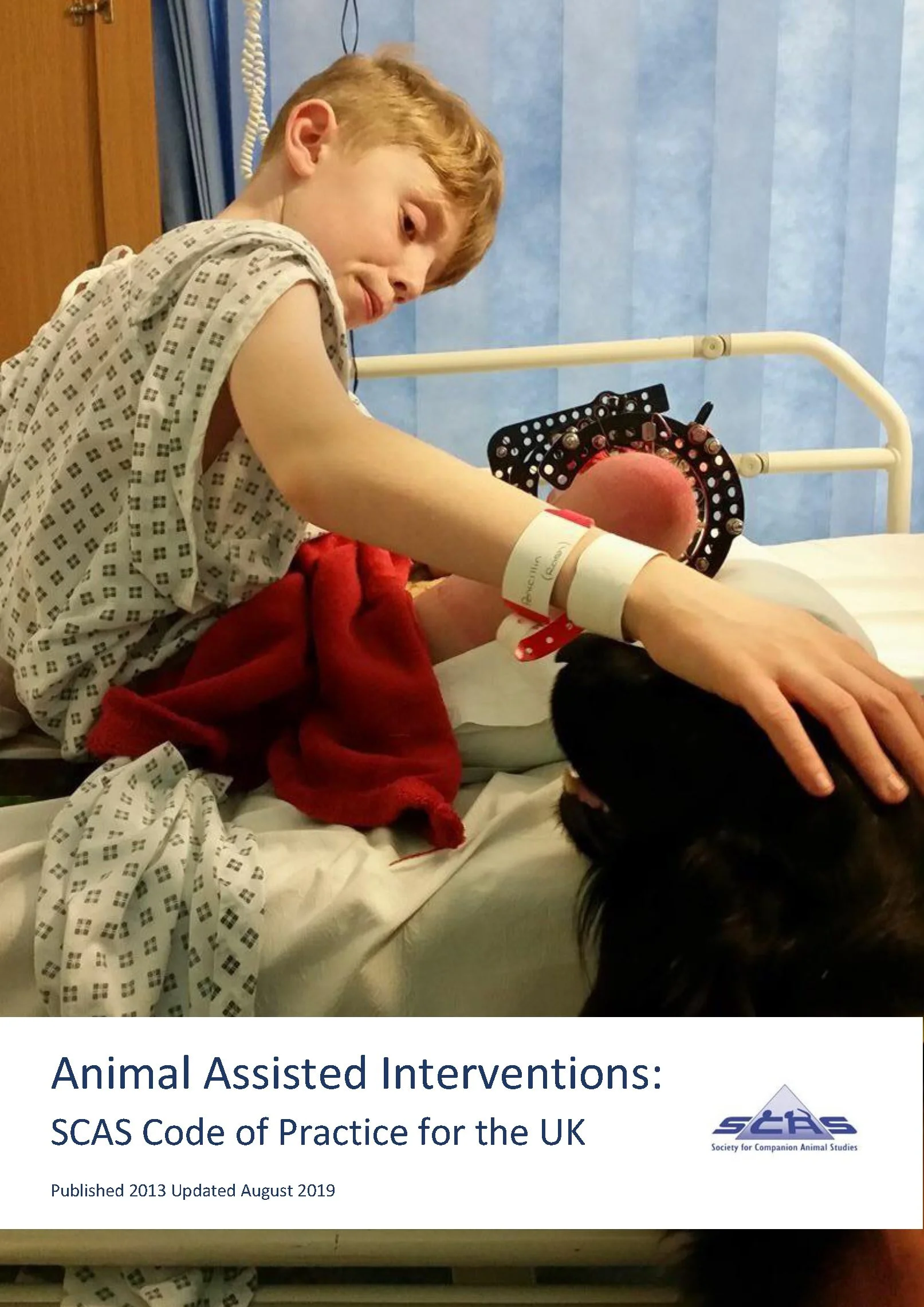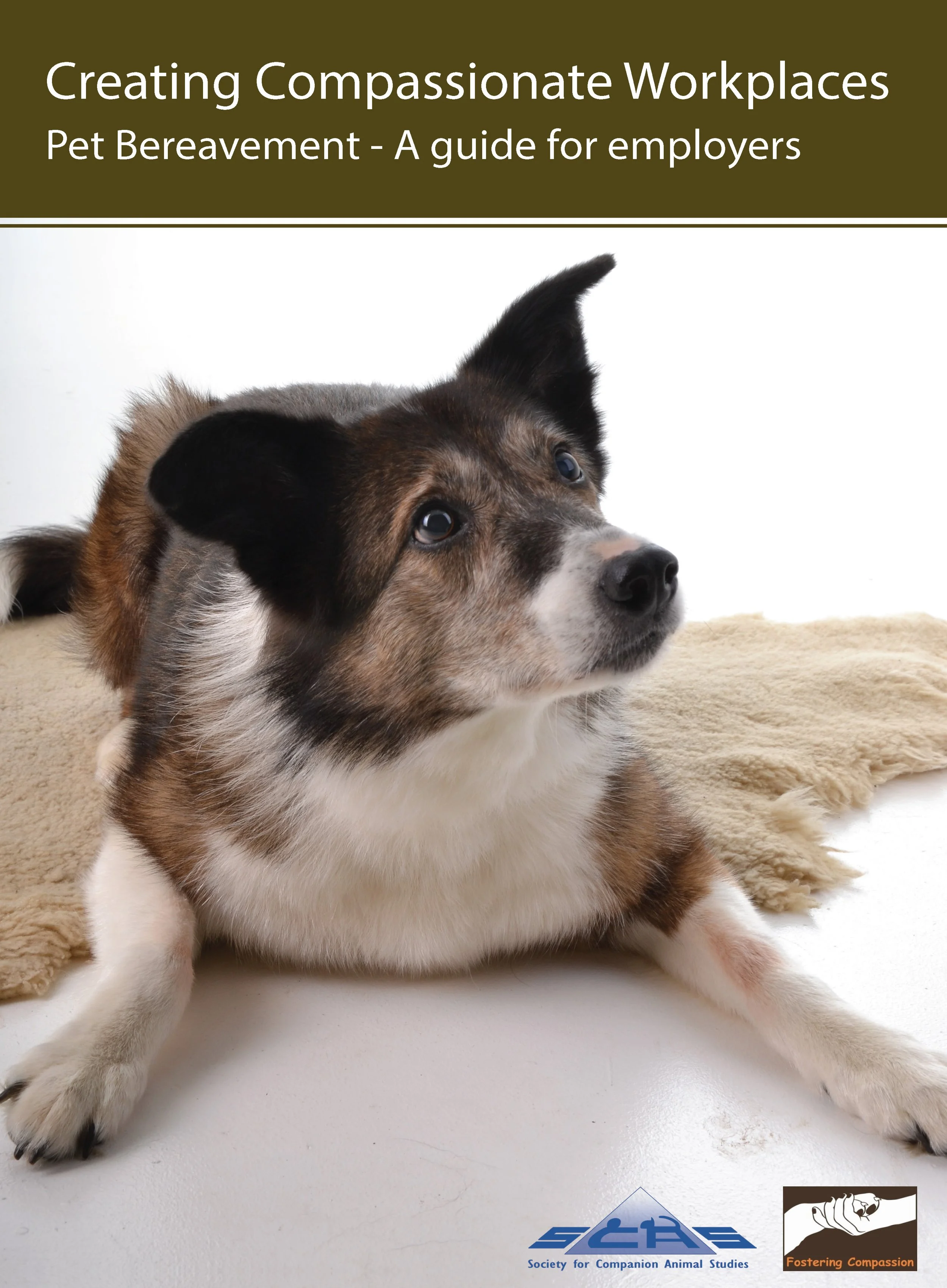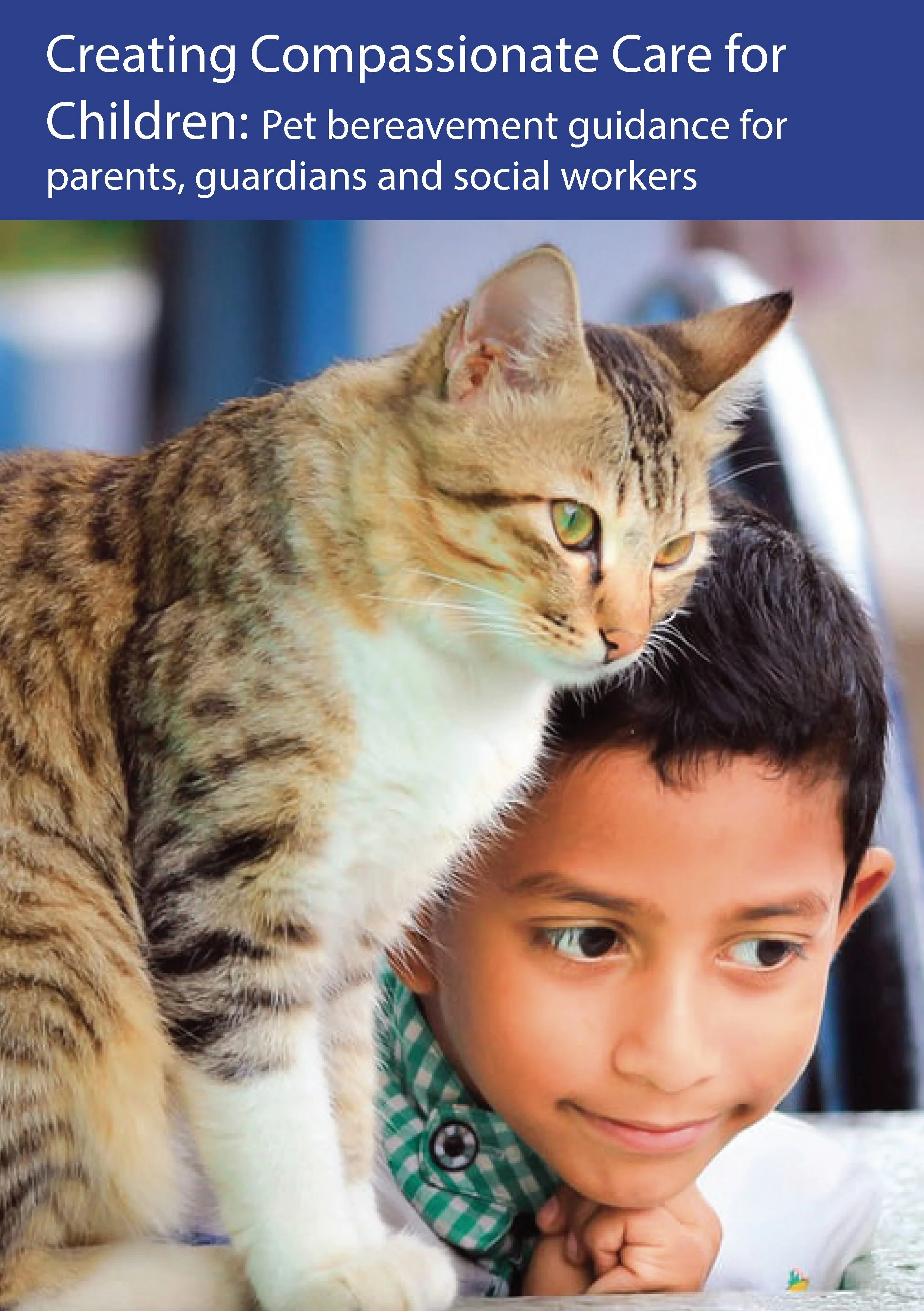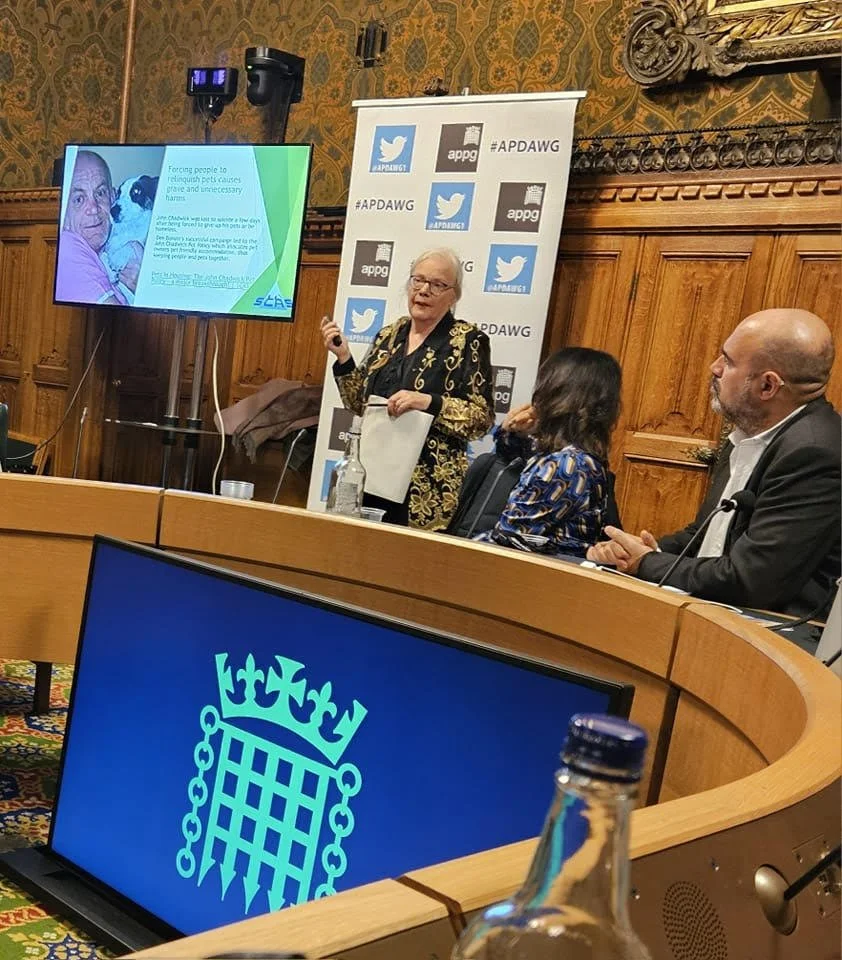SCAS Key Initiatives
As a result of its interdisciplinary membership, and having members drawn from academia and practice and who represent a wide range of professions, SCAS has been well placed to address and advise on some pressing social problems. SCAS and its members have created a range of programmes and initiatives aimed at fostering positive human-animal relationships and applying these in therapeutic, rehabilitative and educational contexts.
The SCAS Code of Practice for Animal Assisted Services
The SCAS Code guides practitioners through essential steps when planning and implementing animal-assisted services in health and social care facilities and in education. Through collaborative working, our members produced this comprehensive guidance to help ensure the highest standards of care for both people and animals in these situations.
It emphasises the importance of safety, ethical considerations, and the well-being of all participants. By adhering to these guidelines, practitioners can create effective and humane services that maximise the benefits of human-animal interactions while safeguarding the welfare of the animals involved.
The SCAS Code covers various aspects of animal-assisted services, including the selection and training of animals, the qualifications and responsibilities of handlers, and the protocols for conducting sessions. It outlines the criteria for assessing the suitability of animals for therapeutic work, ensuring that they are healthy, well-behaved, and comfortable in different environments. The document also provides guidance on the ethical treatment of animals, emphasising the need for respect, compassion, and consideration of their physical and emotional needs.
Additionally, the SCAS Code addresses the importance of monitoring and evaluating the effectiveness of animal-assisted services. It encourages practitioners to collect data, seek feedback, and continuously improve their practices to achieve the best outcomes for both humans and animals. By following these guidelines, SCAS aims to promote the responsible and ethical use of animals in therapeutic settings, enhancing the quality of life for all involved. We have been providing such guidance since 1987, when we published SCAS Guidelines for the Introduction of Pets into Nursing Homes and other Institutions.
SCAS Research
SCAS has conducted and funded research on many aspects of human-animal interactions. The organisation's research team collaborates with universities, research institutions, and other organisations to study the physiological, psychological, and social effects of these interactions. Findings from SCAS-funded research have been published in numerous scientific journals and have contributed to the growing body of evidence supporting the positive impact of companion animals on human health.
1991 - The Founding of IAHAIO
SCAS was the first organisation in the world established to study human-animal interaction. Organisations with similar aims were subsequently established in other countries. The founders of the organisations recognised the importance of promoting and advancing the field of human-animal interactions on a global scale, and in 1990, representatives from SCAS (UK), AFIRAC - Association Francaise d@Information et de Recherche sur L'Animal de Compagne (France), the Delta Society - now called Pet Partners (USA), Delta Australia, HABAC - Human-Animal Bond Association of Canada (Canada) and IEMT (Austria) met in Toronto, where they founded The International Association of Human-Animal Interaction Organisations (IAHAIO). Dr. Sam Ahmedzai, then Chair of SCAS, was the first President of IAHAIO. Professor Emeritus Sam Ahmedzai is one of SCAS’ Vice Presidents.
IAHAIO's mission is to foster collaboration among organisations and individuals involved in human-animal interactions, to support the development of best practices, and to promote the positive impact of these interactions on human health and well-being. Since the founding of IAHAIO, SCAS members have played, and continue to play pivotal roles in advancing its work, e.g. by serving on the IAHAIO Board, creating IAHAIO best practice guidelines and position papers, giving presentations and running workshops at IAHAIO conferences.
The SCAS Pet Loss Support Service
It was the seminal research on the effects of pet bereavement by Dr Mary Stewart DVM that resulted in a deep understanding of the profound effects of pet loss. Mary was one of the founders of SCAS. Her work in this field is renowned in the UK and overseas and led to the creation of the Pet Loss Support Service (PLSS) in 1994.
The PLSS was launched by SCAS at the British Small Animal Veterinary Association (BSAVA) Congress and since then has enjoyed strong support from the veterinary profession. The service has grown from strength to strength. It is a leading provider of pet loss support in the UK and internationally. It has striven to make its services accessible to all pet guardians, and those supporting grieving guardians. Support and information is offered free of charge by a free phone helpline to those in the UK. An email support line is available free of charge to people in the UK and international callers. The service operates 12 hours daily, every day of the year. Callers receive support from a team of staff and volunteers, all of whom have undertaken specialised training and who have experienced pet bereavement themselves.
PLSS offers veterinary practices an excellent source of support for clients facing any circumstances of pet loss – missing pets, having to relinquish pets due to pets in housing bans or behavioural issues. Support is offered at any point through this experience, for example support when animals have a terminal diagnosis, pre and post euthanasia support.
Since 2012, our award-winning programme has been operated by the Blue Cross charity. This is a free service and operates 12 hours every day of the year.
If the grief feels overwhelming, seek help from your GP or a professional counsellor or therapist who specializes in pet loss. They can offer support and techniques to manage the emotions that come with loss. The journal Psychology Today maintains an online list of accredited therapist and counsellors, with information about their qualifications, areas of expertise and whether they offer in person or online consultations. Find Counselling, Therapists, Psychologists - Psychology Today UK. It has been our experience that pet bereavement support is very helpful.
Toolkits to support older people and their animal companions
SCAS funded the development of the SAFE Toolkit – a comprehensive risk assessment to be used by care home staff when someone is transitioning to a facility and wishes to bring their pet with them.
SCAS is currently funding the adaptation of the Dutch PET@home Toolkit for the UK. This supports older people ageing in place with their pets and will be enormously helpful.
Advocacy
In addition to its research and programmatic efforts, SCAS is actively involved in advocacy and education. The organisation works to raise awareness about the importance of human-animal relationships and to promote policies that support the well-being of both people and animals. In addition to its advocacy for pet-inclusive housing, SCAS advocates for the inclusion of animals in therapeutic, educational, and community settings. It also provides resources and training for professionals in these fields.
SCAS offers a variety of educational opportunities for individuals interested in learning more about human-animal interactions. The organisation hosts conferences, workshops, and webinars that feature leading experts in the field. These events provide valuable insights into the latest research, best practices, and emerging trends in human-animal studies. Additionally, SCAS publishes a quarterly newsletter for its members that includes articles and reviews on topics related to companion animals and their impact on human health.
Since its inauguration, SCAS has advocated for pet-inclusive housing and has taken a leadership role in this subject. To raise awareness about the many serious and usually unintended far-reaching consequences of pet keeping bans in accommodation, SCAS has spearheaded a range of actions. These have included forming Pathway in the 1990s - a pets in housing advisory group. We have organised themed conferences, workshops and seminars on the subject throughout the UK. SCAS members have delivered invited presentations to committees in the House of Commons, the House of Lords, in the Scottish Parliament and to parliamentarians in Brussels. SCAS has engaged with TV, radio and national press to voice its concerns about the lack of pet-inclusive housing. In 1998, SCAS launched its Pets for Life campaign to support the first pets in housing bill, and over the following 27 years, we have supported a series of Parliamentary bills introduced to both the Westminster and Scottish Parliaments. Unfortunately, all these bills were prorogued – they ran out of parliamentary time, and so did not succeed.
We are very delighted by the progress of the current Renters’ Rights Bill and a similar Bill in Scotland. We anticipate that both Bills should be enacted very soon. These will allow more people to enjoy the companionship and benefits of having a companion animal. However, they will not apply to social housing – where pets can still be banned.
Learn more about the role of SCAS advocacy for pet-inclusive housing here.
Impact on Society
The work of SCAS and its members has a profound impact on society, particularly in the areas of health, education, and community well-being. Through the educational and practical work of SCAS and its members, comfort and joy have been brought to countless individuals in hospitals, nursing homes, and other institutions. The presence of therapy animals has been shown to improve mood, reduce stress, and enhance overall well-being, making a significant difference in the lives of patients and residents.
SCAS' research efforts have contributed to a deeper understanding of the benefits of human-animal interactions. The organisation's studies have provided evidence that supports the inclusion of animals in therapeutic and educational settings, and they have influenced policies, generating safe practices in these areas.
“Through its research, programmes, advocacy, and education initiatives, SCAS has made significant contributions to the health and well-being of both people and animals. The organisation’s work has had a lasting impact on society, and it continues to be a driving force in the field of human-animal studies. As we look to the future, SCAS remains committed to its mission of enhancing the quality of life for all through the power of companion animals.”








